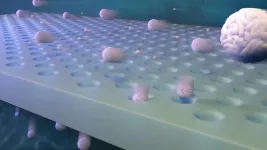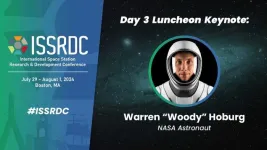(Press-News.org) [The following is a guest editorial written by Dr Lex van Loon, an assistant professor at the Australian National University and the University of Twente in the Netherlands. He is co-author of a new Frontiers in Physiology article.]
Space exploration has always captivated our imagination, offering the promise of discovering new worlds and pushing the boundaries of human capability. As commercial space travel becomes more accessible, individuals with various underlying health conditions—including heart failure—may soon be among those venturing beyond Earth’s atmosphere. This raises critical questions about the impact of space travel on humans with potential underlying health problems. My recent research, ‘Computational modeling of heart failure in microgravity transitions,’ delves into this issue, offering insights that could shape the future of space travel.
Why study heart failure in space?
The demographic of commercial space travelers is shifting, increasingly including older, wealthy individuals who may not be in optimal health. Unlike professional astronauts, these space tourists typically do not undergo rigorous health screenings or physical training. This shift necessitates a broader consideration of health conditions, such as heart failure, diabetes, and other chronic illnesses, in space mission planning.
Heart failure alone affects over 100 million people globally. Traditionally, space medicine has focused on the effects of microgravity on healthy astronauts. However, the inclusion of non-professional astronauts with preexisting health conditions demands a deeper understanding of how microgravity impacts these individuals. The unique cardiovascular challenges posed by space travel could significantly affect heart failure patients, making this an essential area of study.
Furthermore, heart failure is not a uniform condition and can be broadly categorized into two types. One type involves a weakened heart that cannot pump blood effectively, while the other is characterized by the heart’s inability to relax and fill properly. These differences mean that each type of heart failure presents unique challenges and must be studied separately to understand the specific risks and required countermeasures in a microgravity environment.
The challenges of microgravity
In the microgravity environment of space, the human body undergoes significant changes. One of the most notable effects is the redistribution of bodily fluids, causing what is commonly known as ‘puffy face bird leg’ syndrome. Imagine a person with a swollen, puffy face paired with skinny, almost comically thin legs—like a bird, what’s in the name. This fluid shift results in reduced venous pooling in the legs and increased venous pressure in the upper body. For healthy individuals, the cardiovascular system can adapt to these changes, but for heart failure patients, the risks are substantially higher.
Using computational models to simulate space conditions
Given the lack of real-world data on heart failure patients in space, we turned to computational modeling to simulate the effects of microgravity. We used our previously published 21-compartment mathematical model of the cardiovascular system. By tuning the parameters of this model, we were able to predict how heart failure patients might respond during space travel with a high degree of accuracy.
Our simulations revealed that entry into microgravity increases cardiac output in all individuals. However, for heart failure patients, this increase in cardiac output is accompanied by a dangerous rise in left atrial pressure, which can lead to pulmonary edema—a condition where fluid accumulates in the lungs, making it difficult to breathe.
The path forward
Our research underscores the need for comprehensive health screenings and personalized medical plans for space tourists with underlying health conditions. As commercial space travel becomes more accessible, ensuring the safety of all passengers, especially those with chronic health conditions like heart failure, is paramount.
Moreover, our findings highlight the importance of further research into the long-term effects of space travel on cardiovascular health. Future studies should focus on the prolonged exposure to microgravity and the cumulative impact of comorbidities in heart failure patients.
The role of human digital twins
One promising avenue for future research and safety in space travel is the development of human digital twins. A human digital twin is a highly detailed virtual model of an individual's physiological systems. By creating these digital replicas, we can simulate various scenarios and predict how different conditions, such as microgravity, might affect an individual's health. This approach allows for personalized risk assessments and tailored countermeasures.
For heart failure patients, a digital twin could simulate how their specific heart condition would respond to the stresses of space travel. This personalized model could help identify the most effective pre-flight preparations and in-flight interventions, thereby enhancing the safety and well-being of space tourists with heart conditions.
The dream of space travel is closer than ever, but with it comes the responsibility to understand and mitigate the health risks associated with this new frontier. Our computational modeling provides a critical step toward ensuring that space travel is safe for everyone, including those with heart failure. As we continue to push the boundaries of exploration, integrating advanced technologies like human digital twins will be crucial in protecting the health and well-being of all who venture into the final frontier.
END
Heart failure in space: scientists calculate potential health threats facing future space tourists in microgravity
Researchers used a model of the heart and lung system to simulate how microgravity could affect space tourists who might have underlying health issues such as heart conditions
2024-06-21
ELSE PRESS RELEASES FROM THIS DATE:
Experts offer guidance on talking with children about racism at pediatrician's office
2024-06-21
Extensive research shows the link between exposure to racism during childhood and adolescence and increased risks of depression and metabolic health issues, such as obesity, diabetes and heart disease. Conversely, racial socialization, described as behaviors and practices that teach children about race and ethnic identity, has shown potential in mitigating these negative effects, and discussions like these could be effective in pediatric clinics, according to the first expert consensus guidance on this topic published in Pediatrics.
“Over the years, numerous calls to action have been made to address racism in medicine. ...
Drugs for HIV and AIDS trialed as brain tumor treatment for first time
2024-06-21
Drugs developed to combat HIV and AIDS are being trialled for the first time in patients with multiple brain tumours.
Scientists at the Brain Tumour Research Centre of Excellence at the University of Plymouth are conducting a clinical trial to see whether using anti-retroviral medications, Ritonavir and Lopinavir, could help people with Neurofibromatosis 2 (NF2).
The rare inherited genetic condition causes tumours such as schwannoma (which include acoustic neuroma), ependymoma and meningioma which develop ...
Breakthrough in nanoscale force measurement opens doors to unprecedented biological insights
2024-06-21
Groundbreaking research has revealed a new way to measure incredibly minute forces at the nanoscale in water, pushing the boundaries of what scientists know about the microscopic world.
The significant nanotechnology advance was achieved by researchers from Beihang University in China with RMIT University and other leading institutions including the Australian National University and University of Technology Sydney.
The new technique, involving a super-resolved photonic force microscope (SRPFM), is capable of detecting forces in water as small as 108.2 attonewtons—a scale so minute that it compares to measuring the weight of a virus.
Lead ...
Scientists discover new behavior of membranes that could lead to unprecedented separations
2024-06-21
Imagine a close basketball game that comes down to the final shot. The probability of the ball going through the hoop might be fairly low, but it would dramatically increase if the player were afforded the opportunity to shoot it over and over.
A similar idea is at play in the scientific field of membrane separations, a key process central to industries that include everything from biotechnology to petrochemicals to water treatment to food and beverage.
“Separations lie at the heart of so many of the products we use in our everyday lives,” said Seth Darling, head of the Advanced Materials for Energy Water Systems (AMEWS) Center at the U.S. Department of ...
When inflicting pain on others pays off T
2024-06-21
Oh, the joy of inflicting pain upon others. The Germans have a word for it: schadenfreude, meaning “malicious pleasure.” And tapping into its sentiment properly can, ironically, do a lot of good by raising money for charity.
In a groundbreaking paper published in the Journal of Consumer Psychology, UC Riverside School of Business marketing professor and associate dean Thomas Kramer and co-authors articulate and quantify the appeal of schadenfreude (pronounced Sha-den-froid-e) through the lens of marketing psychology.
Through a series of behavioral scenario studies, their paper provides insights ...
The Lancet: Managing gestational diabetes much earlier in pregnancy can prevent complications and improve long-term health outcomes, experts say
2024-06-21
The Lancet: Managing gestational diabetes much earlier in pregnancy can prevent complications and improve long-term health outcomes, experts say
Speaking at the American Diabetes Association 84th Scientific Sessions, authors of a new Lancet Series challenge current approaches to managing gestational diabetes (a type of diabetes that can be diagnosed during pregnancy) and call for initiating treatment much earlier to prevent complications during pregnancy and beyond. [1].
Gestational Diabetes Mellitus (GDM), commonly referred to as gestational diabetes, is the most common ...
New study finds dinosaur fossils did not inspire the mythological griffin
2024-06-21
A popular and widely-promoted claim that dinosaur fossils inspired the legend of the griffin, the mythological creature with a raptorial bird head and wings on a lion body, has been challenged in a new study.
The specific link between dinosaur fossils and griffin mythology was proposed over 30 years ago in a series of papers and books written by folklorist Adrienne Mayor. These started with the 1989 Cryptozoology paper entitled ‘Paleocryptozoology: a call for collaboration between classicists and cryptozoologists’, and was cemented in the seminal 2000 ...
NASA astronaut Woody Hoburg to deliver keynote address at ISSRDC focused on developing a space workforce
2024-06-20
BOSTON (MA), June 20, 2024 – NASA astronaut Warren “Woody” Hoburg will deliver a keynote address at the International Space Station Research and Development Conference (ISSRDC) in Boston on Thursday, August 1, 2024. Hoburg has close ties to Boston as a graduate and former assistant professor of aeronautics and astronautics at the Massachusetts Institute of Technology (MIT).
Hoburg’s address will focus on his six-month science expedition on the space station and the importance of shaping the future workforce ...
Study: Fatigue-management training improved sleep, safety, well-being for Seattle police
2024-06-20
Policing is a profession that features shift work and long hours, both of which can lead to insufficient sleep and fatigue. Because of the unique demands of the job, fatigue raises risks related to decision making, impulse control, driving, and other aspects of work. In a new study, researchers tested the effect of a fatigue-management program on the sleep, mental health, well-being, and safety of police employees in Seattle. The training improved sleep duration as well as various aspects of employees’ safety and well-being.
The study, by researchers at Washington State University (WSU) and the Seattle Police Department, ...
Guiding humanity beyond the moon: OHIO’s Nate Szewczyk and students coauthor papers published in “Nature” journals that revolutionize human space biology
2024-06-20
What actually happens to the human body in space? While scientists and researchers have heavily researched how various factors impact the human body here on Earth, the amount of information available about changes that occur in the body in space is not as well-known. Scientists, including OHIO’s Nate Szewczyk and several of his trainees, have been studying for years how the body, specifically on the molecular side, changes in space. Recently, a new package of papers has been published in “Nature” journals depicting how the modern tools of molecular biology and precision medicine can help guide humanity into more challenging missions beyond where we’ve already been.
The ...
LAST 30 PRESS RELEASES:
Gut microbiome connected with heart disease precursor
Nitrous oxide, a product of fertilizer use, may harm some soil bacteria
FAU lands $4.5M US Air Force T-1A Jayhawk flight simulator
SimTac: A physics-based simulator for vision-based tactile sensing with biomorphic structures
Preparing students to deal with ‘reality shock’ in the workplace
Researchers develop beating, 3D-printed heart model for surgical practice
Black soldier fly larvae show promise for safe organic waste removal
People with COPD commonly misuse medications
How periodontitis-linked bacteria accelerate osteoporosis-like bone loss through the gut
Understanding how cells take up and use isolated ‘powerhouses’ to restore energy function
Ten-point plan to deliver climate education unveiled by experts
Team led by UC San Diego researchers selected for prestigious global cancer prize
Study: Reported crop yield gains from breeding may be overstated
Stem cells from human baby teeth show promise for treating cerebral palsy
Chimps’ love for crystals could help us understand our own ancestors’ fascination with these stones
Vaginal estrogen therapy not linked to cancer recurrence in survivors of endometrial cancer
How estrogen helps protect women from high blood pressure
Breaking the efficiency barrier: Researchers propose multi-stage solar system to harness the full spectrum
A new name, a new beginning: Building a green energy future together
From algorithms to atoms: How artificial intelligence is accelerating the discovery of next-generation energy materials
Loneliness linked to fear of embarrassment: teen research
New MOH–NUS Fellowship launched to strengthen everyday ethics in Singapore’s healthcare sector
Sungkyunkwan University researchers develop next-generation transparent electrode without rare metal indium
What's going on inside quantum computers?: New method simplifies process tomography
This ancient plant-eater had a twisted jaw and sideways-facing teeth
Jackdaw chicks listen to adults to learn about predators
Toxic algal bloom has taken a heavy toll on mental health
Beyond silicon: SKKU team presents Indium Selenide roadmap for ultra-low-power AI and quantum computing
Sugar comforts newborn babies during painful procedures
Pollen exposure linked to poorer exam results taken at the end of secondary school
[Press-News.org] Heart failure in space: scientists calculate potential health threats facing future space tourists in microgravityResearchers used a model of the heart and lung system to simulate how microgravity could affect space tourists who might have underlying health issues such as heart conditions







